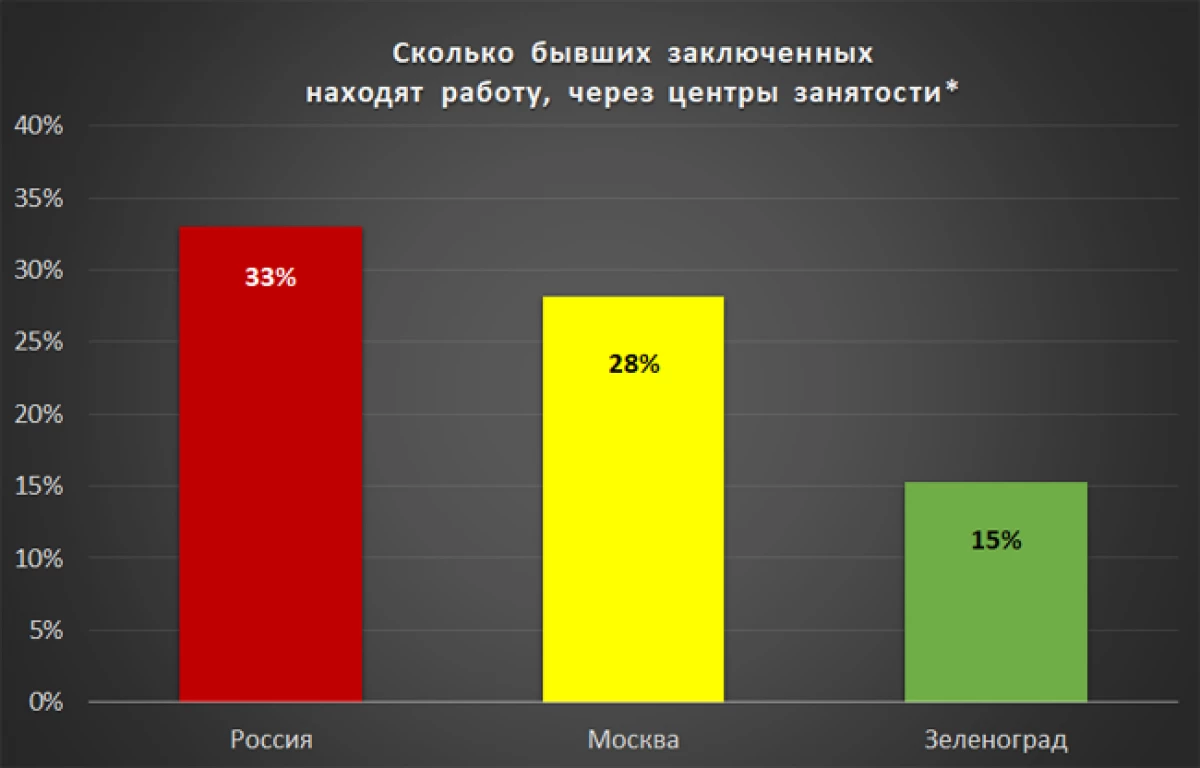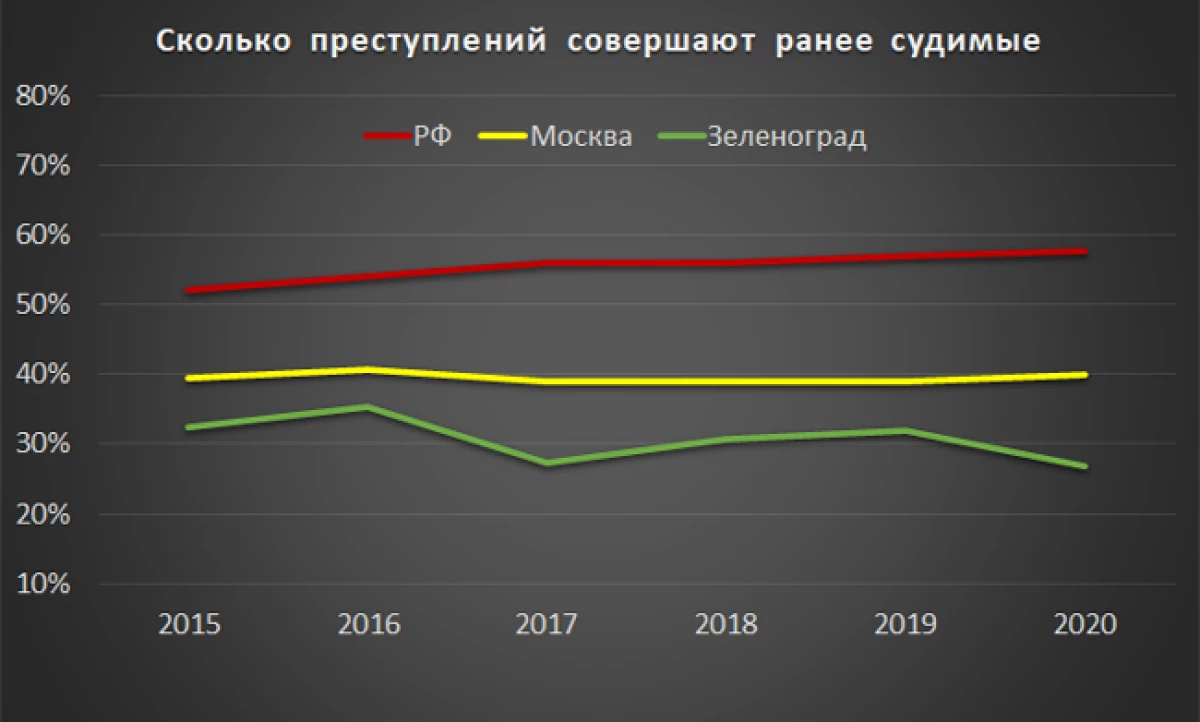In almost every Zelenograd house, people who returned from the places of detention live in every Zelenograd house. Leaving free, people most often turn out to be not ready for a new life, especially if they conducted a few years in conclusion or were in the colonies of a strict regime. In particular, it is difficult for them to find work. And although in the Zelenograd employment center dozens of suitable vacancies, employment efficiency in it is significantly lower than on average in Moscow. We tell me what the state makes the state for socializing former prisoners and where they can be asked for help.
What is the problem
Among the convicts in Russian correctional colonies, 63 percent are people convicted in the second, third and even fourth time. According to Senator Inna Holynko, 45 percent of the crime re-committed it is that they pushed them the lack of work.
Going free, people face a lack of education and labor skills (although in colonies almost all make: from cars to clothing), with alcoholism or drug addiction, with unemployment, homelessness and general social disadvantage. These problems lists the junior researcher at the Institute of Enforcement Problems at the European University in St. Petersburg Ksenia Runov.
In addition, for a long time in conclusion (on average in Russia it is two years), a person disperses to make decisions and be responsible for his life. Now there are several non-state funds in our country that help former prisoners return to normal life, but these are point decisions, and you need a fundamental, integrated approach.
What in Zelenograd?
Committing to freedom, people can contact the Employment Center or during the serving of punishment to ask for help with the work of the FSIN. The statistics that Ksenia Runova leads is depressing. According to her, about 20 percent of the former convicts, which, before condemnation, lived in the region, annually appeal to employment centers. Only a third of them get a job. If you compare with conventional people, the employment centers are employed twice as more applied. Professional training seems to not help. After it, it is also employed only every third.
In Moscow, this situation is slightly worse than on average in the country - as reported by Zelenograd.ru in the department of social protection from 2015 to 2020, 28% of the former prisoners who applied to Moscow employment centers were found.
But in Zelenograd, the situation is much worse - only 15% of applicants who applied former prisoners find work. For five years, this is only 35 people. They employed on such vacancies as a coach, a manager in commercial activities, a seller, operator, seamstress, a component, installer, cook.

In the management of the FSIN in Moscow, "Zelenograd.ru" reported that since the beginning of 2020, none of the people in the colony-settlement for help with the search for administration did not appeal. Also in the department reported that a psychologist and a social worker were operating with convicts throughout the entire period of serving.
Read also for the cleaning of yards in Zelenograd came out convicts. Where do they work? How many do they pay? Who follows them?
So we have more radicivists?
Statistics do not show this. In our city, about a third of all (investigated) crimes accounted for already convicted people. This trend continues at least since 2015. But this is a good indicator regarding Moscow as a whole. There, for the same periods, it is necessary for the share of previously convicted (according to the portal of legal statistics) about 40% of the investigated crimes. Even worse in Russia - this number is constantly growing and now reaches 58%.

It is difficult to say why Zelenograd statistics does not show the relationship between low employment efficiency through official channels and recurrence levels. But in any case, the socialization of former prisoners, including through employment, is an important safety factor in residents.
Read also in the yard of 3 microdistrics, a previously convicted man killed a student with a knife. He was found on video surveillance cameras
What makes the state to help the convicted
According to Ksenia, Runova, mandatory material forms of support for human freedom, except for paying in the amount of 850 rubles and pay to the place of residence, not provided.
The state can support this person in several ways. The first is the work of employment centers. Here, a person can get the status of unemployed and allowance in accordance with his work experience. Employment centers can offer vacancies, vocational training and learning activities for vocational guidance.
Second form of support - social adaptation centers. They provide temporary homeless housing, assist in restoring documents, legal assistance, give hot food, essential items. In some regions there are benefits for enterprises that employ former convicts.
In 2019, Rostrud and FSIN of Russia signed an agreement in which the persons released from the places of detention help with finding work. It was reported that in the framework of the agreement, the colonies will post a summary of convicts in the total database of Rostrud's vacancy "work in Russia".
On the website of the Department of Society of Moscow there is a bank of vacancies, including for people who came from a correctional institution. At the time of preparation of the material in it there was only one vacancy: a company that specializes in moving is looking for 15 handymen.
How to build work in Moscow
The Department of Society told how they work with people who have a criminal record.
- Those who have not worked for a long time, the employment center proposes to pass a number of tests to understand the competence of a person - on the basis of current qualifications, professional and personal competencies, it will be offered to determine the main job search strategy - if necessary, a person will select a program of retraining or trainers - after individual counseling career Experts of the Employment Center reveal barriers to employment, help to negotiate with the employer about the upcoming interview and prepare for its successful passage - the Center specialists can also have psychological support
Because of it often biased by employers' relations, people with conviction offer to open their own business. They will be helped to make a business plan and will help to issue all the documents, and can also compensate the costs of registration of IP and LLC.
Since the work in a correctional institution is counted in the overall work experience, unemployment benefit for such a person is not more than 12.3 thousand rubles per month, it is paid no more than six months. This is a federal allowance, in Moscow additionally charge 1.5 thousand rubles to compensate for the expenditure for public transport and 850 rubles as an extra charge to unemployment benefit.
According to the Department, in 2020, data on employment services sent more than 700 citizens who were released. Employment centers also call people registered with the police.
Where can I contact after liberation
The Social and Rehabilitation Center "Aurora" helps convicted women, engaged in the prevention of socially dangerous forms of the behavior of women and minor girls. In 2020, about 200 people received assistance in the fund. Phone: 8-499-259-06-23, 8-499-259-16-07, To seek help, you can fill out the form on the site.
The employment center in Moscow: 8-495-705-75-75.
The Center for Social Adaptation for Persons without a certain place of residence and classes named after E. P. Glinka: 8-499-357-10-65.
Dmitrovsky Center for Social Adaptation for People without a certain place of residence and classes, pensioners, persons with disabilities, as well as persons liberated from seats of imprisonment: Dmitrov, ul. Slot, D.1A, 8-496-227-88-11.
The Klin Center of Social Adaptation works with people without a certain place of residence, and also engaged in the prevention of homelessness: Moscow region, Klin district, Village Zaranier, House 24a, 8-496-247-61-56.
The Christian shelter for homeless people "House of hardworking Noah" restores the wards documents, arranges conversations for spiritual, social and psychological topics, helps to find a job: 8-926-236-54-22.
What is missing
Ksenia Runova draws attention to complaints of regional authorities: because of the gaps in the legislation, it is difficult to systematically engage in the social adaptation of the former convicts. For example, they need a framework federal law on the reassocialization of former convicts. And in the federal law "On the basis of a system for the prevention of offenses in the Russian Federation" as a category of people who need social adaptation, you need to add people to freedom. You can also regulate the quotation of jobs for former convicts in the regions.
With such a proposal to the Moscow Maritime in 2016, the foundation "in defense of prisoners' rights" was addressed (recognized as a foreign agent in 2019). Fund Experts requested the decision of the Moscow Government, which would oblige employers to establish job quotas for convicted. The Department of Society then said that the introduction of quotas for this category of citizens is not planned.
